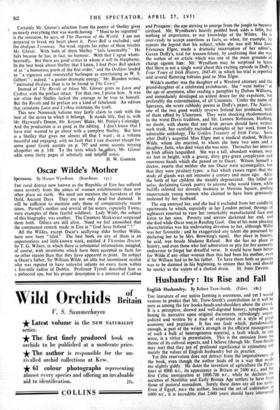Oscar Wilde's Mother
Speranza. By Horace Wyndham. (Boardman. t se.) THE rural district now known as the Republic of Eire has suffered more severely from the antics of women exhibitionists than any other place on earth. We need not mention the harridans of the Ould, Ancient Days. They are not only dead but damned. It will be sufficient to mention only those of comparatively recent times. Parnell's mother and several of his sisters, especially Fanny, were examples of these fearful wildfowl. Lady Wilde, the subject of this biography, was another. The Countess Mafkievicz surpassed them both. Others are still alive. Need we feel astonished that the commonest remark made in Eire is "God Save Ireland " ?
All the Wildes, except Oscar's scallywag elder brother Willie, have now been " Wed." The best book on any of them is an unpretentious and little-known work, entitled A Victorian Doctor, by T. G. Wilson, in which there is substantial information, mingled, of course, with inventions which have been accepted as facts for no other reason than that they have appeared in print. Its subject is Oscar's father, Sir William Wilde, an able but incontinent oculist who was reputed to have unlawful infants on every farm within a five-mile radius of Dublin. Professor Tyrrell described him as .1 pithecoid ape, but his proper description is a mixture of Caliban and Prospero: the ape striving to emerge from the jungle to become civilised. Mr. Wyndham's heavily padded book adds a little, but nothing of importance, to our knowledge of the Wildes. He is over-ready to accept assertions as facts, as when, for example, he repeats the legend that his subject, while she was still Miss Jane Francesca Elgee, made a dramatic interruption of her editor's, Gavan Duffy's, trial for treason-felony, by confessing that she was the author of an article which was one of the main grounds of charge against him: Mr. Wyndham may be surprised to learn that there is not a single word about this exciting episode in Duffy's Four Years of Irish History, 1845-49, in which his trial is reported and several flattering tributes paid to Miss Elgee.
Wilde's mother was the daughter of a Wexford attorney and the grand-daughter of a celebrated archdeacon. She " went native " at the age of seventeen, after reading a pamphlet by Dalton Williams. and immediately developed an ardent desire for the expulsion, but preferably the extermination, of all Unionists. Under the name of Speranza, she wrote rubbishy poems in Duffy's paper, The Nation. one of the two good weekly reviews Ireland has produced, both of them edited by Ulstermen. They were shocking rhodomontade in the worst Davis tradition, and Mr. Lennox Robinson, blushing. no doubt, with shame that any Irish person should have written such trash, has carefully excluded examples of her work from his admirable anthology, The Golden Treasury of Irish Verse. Soon after Duffy's acquittal Miss Elgee met a medical student, William Wilde, whom she married, to whom she bore two sons and a daughter, Isola, who died when she was nine. Thereafter her interest in Irish affairs languished. She was a tall, abundant woman, over six feet in height, with a greasy, dirty grey-green complexion and enormous hands which she passed on to Oscar. Wilson, himself a doctor, asserts that neither she nor Oscar were acromegalics, but that they were pituitary types: a fact which causes regret that the study of glands was not intensive a century and more ago. After the birth of her children she steadily degenerated. She lolled on sofas, declaiming Greek poetry to anyone who would listen, white bailiffs infested her slovenly mansion in Merrion Square, jostling importunate young women who claimed to have been grievously molested by her husband.
The sup annoyed her, and she had it excluded from her candle-lit apartments to which, especially in her London period, throngs of sightseers resorted to view her remarkably manufactured face and listen to her sons. Poverty and sorrow darkened her end, and she died while Oscar was,in Reading Gaol. One of his most pleasing characteristics was his undeviating devotion to her, although Willie was her favourite ; and he exaggerated any talent she possessed by declaring her to be Mrs. Browning's equal. Her place in history. he said, was beside Madame Roland. But she has no place in history, and even those who feel admiration or pity for her earnestly endeavour to forget her dreadful verse. It would have been better for Wilde if any other woman than this had been his mother, even if Sir William had to be his father. To have them both as parents was to be damned in his beginning, to ensure that his end should be murky as the waters of a choked drain. ST. JOHN ERV1NE.


































 Previous page
Previous page